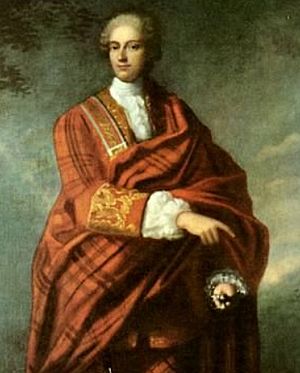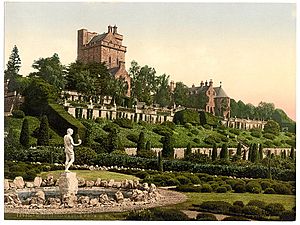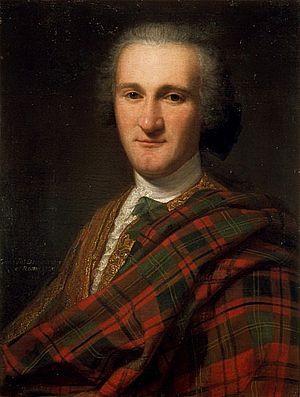James Drummond, 3rd Duke of Perth facts for kids
Quick facts for kids
James Drummond
|
|
|---|---|

James Drummond, 3rd titular Duke of Perth, from a portrait by Allan Ramsay
|
|
| Born | 11 May 1713 |
| Died | 13 May 1746 |
| Nationality | Scottish |
| Occupation | Chief of the Name of Drummond, landowner, Jacobite military officer |
| Parent(s) | James Drummond, 2nd Duke of Perth Jane Gordon |
James Drummond (born May 11, 1713 – died May 13, 1746) was a Scottish landowner. He is best known for his part in the Jacobite rising of 1745. This was a big event where Charles Edward Stuart tried to take back the British throne for his family, the House of Stuart.
Perth was one of the two main generals in the Jacobite Army. After the Jacobites lost the Battle of Culloden, he escaped on a French ship. Sadly, he died during the trip.
Contents
Early Life of James Drummond
James Drummond was born on May 11, 1713. His birthplace was Drummond Castle in Perthshire, Scotland. He was the oldest son of James Drummond, 2nd Duke of Perth and Jane Gordon. His family had strong ties to the Stuart kings for many years.
His grandfather was a high-ranking official for King James II and VII. After a big change in government called the Glorious Revolution, his grandfather went to France. James's father was punished for his role in an earlier Jacobite uprising in 1715. However, he saved the family's large estates by giving them to his son, James, before he was punished.
James grew up at Drummond Castle. After his father died in 1720, James went to school in France. He returned to Scotland in the early 1730s. Even though the government did not officially recognize his title, people often called him the 3rd Duke of Perth.
Most people who knew James described him as a friendly person. He got along well with everyone, no matter their social class. It was noted that he always spoke in a broad Scottish accent. As a landowner, James was very interested in making farms better. He planned a new town in Callander in 1739. He also loved breeding racehorses. His horses raced in big events in England. His horse, Chance, won a famous race in Edinburgh in 1739.
James Drummond and the Jacobite Rising
Some people, like Horace Walpole, called Perth a "silly horse-racing boy." But the government knew he was a strong supporter of the Jacobite cause. They believed he had a lot of influence over many important families. In 1740, he formed a group with other leaders to support the Stuarts. He was very eager to help if a rising happened.
Joining the 1745 Rising
When Charles Edward Stuart landed in Scotland in July 1745, Perth was one of the first people asked for help. The government was worried about his influence. They sent someone to arrest him at Drummond Castle. But Perth managed to escape by climbing out of a window.
He joined Charles in the town of Perth in September. He brought about 200 of his tenants from Crieff with him. These men formed the Duke of Perth's Regiment. It was hard to get many men because of past punishments in the area. But more men joined his regiment later in Edinburgh. By the time the army marched into England, Perth's regiment had about 750 soldiers.
Leading the Jacobite Army
Even though he was quite young, Charles made Perth a senior general in the Jacobite army. He shared this role with Lord George Murray, who was older and more experienced. At first, they took turns leading the army each day. At the Battle of Prestonpans, where the Jacobites won, Perth led the right side of the army.
Some people worried about Perth's military skills. But he was very well-liked. One person said he was "much beloved and esteemed." Another leader, Lord Elcho, called Perth "a very brave man." But he also said Perth had "little genius" and always obeyed Charles.
At the siege of Carlisle, Perth took the lead role. He tried to remember what he learned about math and forts in France. The Jacobites captured the town. However, Murray was not happy with how the siege was handled and resigned. Perth kindly gave up his command, and Murray was put back in charge. This event showed some tension between the army's top leaders.
Perth kept leading his own regiment. He was also part of the Jacobite 'Council of War'. This council made important decisions for the army. At Derby, the council decided to go back to Scotland. This was because they did not get enough support from England and France. Perth was one of the few who suggested they march to North Wales instead.
Later, Perth's younger brother, John Drummond, arrived from France with more soldiers. For the rest of the campaign, John Drummond, Murray, and Perth worked together as brigade commanders.
Actions in 1746
At the siege of Stirling, Perth was in charge of the forces trying to block the government soldiers in the castle. The siege was not successful. After the Jacobite victory at Falkirk in January 1746, the army moved towards Inverness.
From Inverness, Perth led several smaller battles. This included the "Battle of Dornoch" in March. This was a clever attack by boat across the Dornoch Firth. It was called "the most accomplished" attack by either side during the rising.
At Battle of Culloden, the Jacobite army was finally defeated. Perth again led a group of regiments. He was on the army's left side. One officer said that when the soldiers were slow to advance, Perth grabbed their flag. He told them he would call himself "MacDonel" if they won the day. Some reports say Perth was wounded in the hand and back at Culloden. He appeared at Ruthven Barracks the next day. There, Charles told the army to scatter. After this, his exact movements are less clear.
Escape and Death at Sea
Several people who took part in the rising, including Perth, managed to escape. They got on one of the French ships that landed at Borrodale on May 3. Perth had always been said to have a delicate body. The long campaign had made many people very tired and sick. Some stories say he was unwell and had to be carried by his helpers.
One friend remembered seeing Perth waiting on the shore. He was "wrapped up in a blanket." Perth told him, "if we are so fortunate to get to France, depend upon it, then I shall always be your friend." During the trip to France, a fever spread on the ships. Perth, who was on the ship Bellone, was one of those who died. He passed away on May 13. Since the ships could not reach the coast, he was buried at sea.
Perth's reasons for supporting the Jacobites seemed clear to people at the time. He was very loyal to the Stuart family. Perth had no children. His younger brother, John, inherited the claim to the ducal title.
| Peerage of Scotland | ||
|---|---|---|
| Preceded by James Drummond |
— TITULAR — Earl of Perth, Lord Drummond Jacobite peerage 1720–1746 |
Succeeded by John Drummond |
| — TITULAR — Duke of Perth, Marquess of Drummond, Earl of Stobhall, Viscount Cargill & Baron Concraig Jacobite peerage 1720–1746 |
||
 | Aurelia Browder |
 | Nannie Helen Burroughs |
 | Michelle Alexander |



